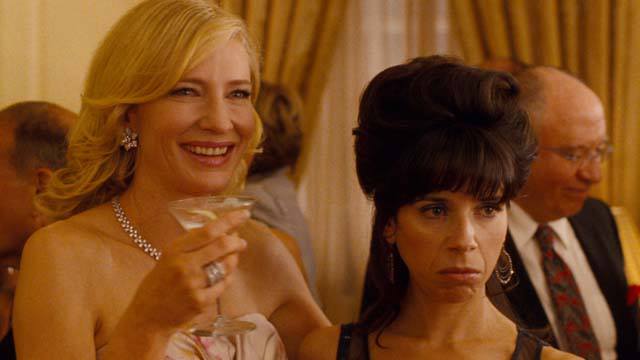For over 40 years, Woody Allen has established himself as one of cinema’s iconic auteur directors with his immaculate lineup of films ranging from his Oscar-winning classic Annie Hall to Hannah and her Sisters and more recently, Midnight in Paris. While many will question the man’s unusual personality (and his even more bizarre private life), he has continued to make intriguing and bold films about flawed individuals whose stories are balanced between light-hearted dialogue and sometimes, elements of tragedy. The latter theme is again touched upon in his latest offering, Blue Jasmine, as he teams up with Oscar-winning actress Cate Blanchett (Lord of the Rings trilogy, The Aviator), a talented and supreme performer who is already receiving a lot of heavy buzz for her performance as she looks to return to the awards circuit….
SYNOPSIS: Well-dressed socialite Jasmine French (Cate Blanchett) turns up to San Francisco completely broke following the disastrous collapse of her marriage to unfaithful husband Hal (Alec Baldwin). She ends up moving in with her adoptive sister Ginger (Sally Hawkins) who leads a simple life with her two sons. However Jasmine struggles to figure out ways of solving her own problems and chooses instead to be critical of her younger sibling’s lifestyle as well as her relationship with grease monkey Chili (Bobby Cannavale). She eventually decides to get a job working for a dentist but finds herself being constantly reminded of the past and knowing full well that she can never forget the way her world fell apart.
As you watch this film, you begin to notice the plot similarities to that of Tennesee Williams’ A Streetcar Named Desire and we soon realise just what Allen is trying to achieve with his re-imagination of that particular story. While it may not be as original as his previous efforts, the veteran filmmaker sets out his complex narrative to make us understand why Jasmine is in such a bad state. When we see her making references to the past in the modern day scenes, flashbacks are used to show her fall from grace and that she has hit rock bottom especially when having to rely on the kindness of strangers (and her supportive sister!). You just know things have gone wrong for her when she winces in dismay at the thought of dating Chili’s average-looking friend or having to take an average job compared to the good life she had a few years earlier. The ultimate humiliation is reducing herself to the point of madness as she neurotically begins talking on her own in front of bamboozled onlookers. While the story may seem basic, it becomes more fascinating to see Jasmine’s downfall through these flashbacks which enable the film to skip back and fourth, a trend Allen has achieved previously with Annie Hall. He also instigates the bond of family again in his script especially through the sibling relationship of Jasmine and Ginger, two women separated by class yet connected by their strong support for each other’s well being. As a character, Jasmine is the prime example of a destructive individual teetering on the verge of a breakdown and only a brilliant actress like Cate Blanchett could produce such a majestic turn. It’s been a while since we saw her produce an award-worthy turn but thankfully she makes a valid case for recognition with her exceptional performance as she makes us feel for Jasmine in the same way we all felt for Streetcar’s Blanche Dubois. Surprisingly though, Sally Hawkins proves just as engaging with her effortless role as Ginger, a woman who puts up with her sister’s snotty comments yet chooses to live the good life despite being caught up in relationship problems with three different lovers. The male actors also contribute with Alec Baldwin injecting a deceitful and slimy persona to Hal while Boardwalk Empire’s Bobby Cannavale and the scene-stealing Andrew Dice Clay round off the terrific ensemble with their stellar and sympathetic roles. Another star of the film that shouldn’t be overlooked is the setting, a trait that Allen has maintained admirably with the city New York. On this occasion though, it’s San Francisco that receives the director’s treatment as his production team triumph in capturing the city’s calm beauty without allowing it to overshadow the story.
But as is the case with some Allen films, it is sometimes hard to figure out whether we are watching a comedy or a drama. Annie Hall it ain’t! Given the gritty nature of the film and its themes of suicide and depression, it becomes hard to laugh at any of the situations taking place especially when the witty dialogue pops up at such randomly awkward moments e.g. Jasmine awaiting a romantic phone call so soon after a near-domestic row between Ginger and Chili. It is obvious too that Allen wants us to root for Jasmine all the way through and while many will sympathise with the character’s appalling state, others will find it hard to root for her as she fails to develop properly and never really seems to learn lessons. The inclusion of a rushed romantic sub-plot involving diplomat Dwight (Peter Sarsgaard) produces the chief flaw of the character as she chooses to lie and when she does get found out, it becomes hard to defend her.
VERDICT: Woody Allen’s bittersweet drama does stutter from a few plot flaws and a polarising lead character but still prevails thanks to a brilliant award-worthy turn from comeback queen Cate Blanchett.


Be the first to comment on "Blue Jasmine – ★★★"